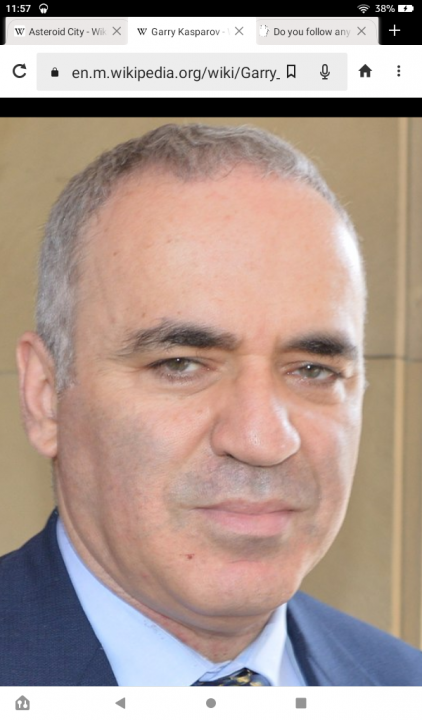
Hold on, you’re not doing this stuff on purpose just to lure me in, are you?

~


Kasparov has written books on chess. He published uha controversial[232] autobiography when still in his early 20s, originally titled Child of Change, later retitled Unlimited Challenge. This book was subsequently updated several times after he became World Champion. Its content is mainly literary, with a small chess component of key unannotated games. He published an annotated games collection in 1983, Fighting Chess: My Games and Career,[233] which has been updated several times in further editions. He also wrote a book annotating the games from his World Chess Championship 1985 victory, World Chess Championship Match: Moscow, 1985.[234]
He has annotated his own games extensively for the Yugoslav Chess Informant series and for other chess publications. In 1982, he co-authored Batsford Chess Openings with British grandmaster Raymond Keene and this book was an enormous seller. It was updated into a second edition in 1989. He also co-authored two opening books with his trainer Alexander Nikitin in the 1980s for British publisher Batsford – on the Classical Variation of the Caro-Kann Defence and on the Scheveningen Variation of the Sicilian Defence. Kasparov has also contributed extensively to the five-volume openings series Encyclopedia of Chess Openings from Chess Informant which Kasparov also wrote personal columns Garry's Choice, the publication which is inarguably the beginning of modern chess.[235][236]
In 2000, Kasparov co-authored Kasparov Against the World: The Story of the Greatest Online Challenge[237] with grandmaster Daniel King. The 202-page book analyzes the 1999 Kasparov versus the World game, and holds the record for the longest analysis devoted to a single chess game.[238]
In 2003, the first volume of his five-volume work Garry Kasparov on My Great Predecessors was published. This volume, which deals with the world chess champions Wilhelm Steinitz, Emanuel Lasker, José Raúl Capablanca, Alexander Alekhine, and some of their strong contemporaries, has received lavish praise from some reviewers (including Nigel Short), while attracting criticism from others for historical inaccuracies and analysis of games directly copied from unattributed sources. Through suggestions on the book's website, most of these shortcomings were corrected in following editions and translations. Despite this, the first volume won the British Chess Federation's Book of the Year award in 2003. Volume two, covering Max Euwe, Mikhail Botvinnik, Vasily Smyslov and Mikhail Tal appeared later in 2003. Volume three, covering Tigran Petrosian and Boris Spassky appeared in early 2004. In December 2004, Kasparov released volume four, which covers Samuel Reshevsky, Miguel Najdorf, and Bent Larsen (none of these three were World Champions), but focuses primarily on Bobby Fischer. The fifth volume, devoted to the chess careers of World Champion Anatoly Karpov and challenger Viktor Korchnoi, was published in March 2006.[239]
His book Revolution in the 70s (published in March 2007) covers "the openings revolution of the 1970s–1980s" and is the first book in a new series called "Modern Chess Series", which intends to cover his matches with Karpov and selected games. The book Revolution in the 70s concerns the revolution in opening theory that was witnessed in that decade. Such systems as the controversial (at the time) "Hedgehog" opening plan of passively developing the pieces no further than the first three ranks are examined in great detail. Kasparov also analyzes some of the most notable games played in that period. In a section at the end of the book, top opening theoreticians provide their own "take" on the progress made in opening theory in the 1980s.[240]
Kasparov published three volumes of his games, spanning his entire career.
In October 2015, Kasparov published a book titled Winter Is Coming: Why Vladimir Putin and the Enemies of the Free World Must Be Stopped. The title is a reference to the HBO television series Game of Thrones. In the book, Kasparov writes about the need for an organization composed solely of democratic countries to replace the United Nations. In an interview, he called the United Nations a "catwalk for dictators".[102]
Kasparov believes that the conventional history of civilization is radically incorrect. Specifically, he believes that the history of ancient civilizations is based on misdatings of events and achievements that actually occurred in the medieval period.[241][242] He has cited several aspects of ancient history that he says are likely to be anachronisms.[243]
Kasparov has written in support of the pseudohistorical New Chronology (Fomenko), although with some reservations.[244] In 2001, he expressed a desire to devote his time to promoting the New Chronology after his chess career. "New Chronology is a great area for investing my intellect ... My analytical abilities are well placed to figure out what was right and what was wrong."[245] "When I stop playing chess, it may well be that I concentrate on promoting these ideas... I believe they can improve our lives."[245]
Later, Kasparov renounced his support of Fomenko theories but reaffirmed his belief that mainstream historical knowledge is highly inconsistent.[246][247]
In 2007, he wrote How Life Imitates Chess, an examination of the parallels between decision-making in chess and in the business world.[248]
In 2008, Kasparov published a sympathetic obituary for Bobby Fischer, writing: "I am often asked if I ever met or played Bobby Fischer. The answer is no, I never had that opportunity. But even though he saw me as a member of the evil chess establishment that he felt had robbed and cheated him, I am sorry I never had a chance to thank him personally for what he did for our sport."[249]
He is the chief advisor for the book publisher Everyman Chess.[250]
Kasparov works closely with Mig Greengard and his comments can often be found on Greengard's blog.[251][252]
Kasparov collaborated with Max Levchin and Peter Thiel on The Blueprint, a book calling for a revival of world innovation, planned to release in March 2013 from W. W. Norton & Company. The book was never released, as the authors disagreed on its contents.[253]
Kasparov argued that chess has become the model for reasoning in the same way that the fruit fly Drosophila melanogaster became a model organism for geneticists, in an editorial comment on Google's AlphaZero chess-playing system. "I was pleased to see that AlphaZero had a dynamic, open style like my own," he wrote in late 2018.[254]
Kasparov served as a consultant for the 2020 Netflix miniseries The Queen's Gambit. He gave an extended interview to Slate describing his contributions.[255]
In 2020, Kasparov collaborated with Matt Calkins, founder and CEO of Appian, on HYPERAUTOMATION, a book about low-code development and the future of business automation. Kasparov wrote the foreword where he discusses his experiences with human–machine relationships.[256][257]
The New York Times published an essay by Kasparov titled "Garry Kasparov: What We Believe About Reality" in 2021.[258] The essay is part of a series called The Big Ideas: What Do We Believe,[259] which also includes essays by T.M. Luhrmann, Harry Reid, Ini Archibong, Errol Morris, and Carlo Rovelli, amongst others.
This post was edited by CosmicWunderkind at November 11, 2022 8:22 PM MST